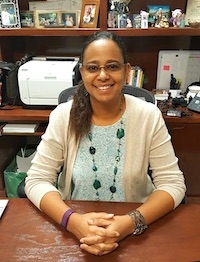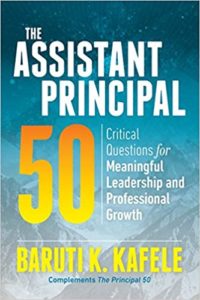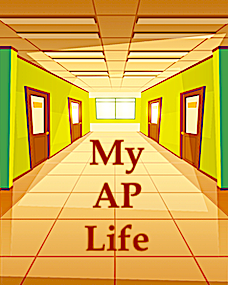My AP Life: A New Blog for Emerging School Leaders
A MiddleWeb Blog
Welcome MiddleWeb’s newest blogger, DeAnna Miller, assistant principal at a K-6 public school in Alabama’s wiregrass region. DeAnna is an Army veteran, a former middle school teacher and instructional coach, and a self-confessed introvert who gives extra attention to all those quiet kids who often get overlooked.
In the two years I’ve been an assistant principal (I’m just now entering year three) I’ve figured out one very important thing: administration is hard!
More specifically, being an AP is hard. You feel stuck between two worlds – the world of the teachers in the classroom and the world of the principal. And you are neither!
You aren’t in the trenches anymore, handling students, creating lessons, managing classroom behaviors. But you are expected to evaluate teachers on these things daily.

The constant stress most APs experience can lead many to decide that administration isn’t for them. And to be honest, there have been several times when I felt like throwing in the proverbial towel and heading back to the classroom or to coaching. But neither my pride, nor my stubbornness, would allow this to happen.
Instead, I decided to do what I always do when something seems too hard to overcome – I research it and read anything I can get my hands on about it. Now I needed to really learn how to be a better AP.
My journey to better myself as an AP led me to the writings of Baruti K. Kafele. And after reading his blog posts, I decided to purchase several of his books, the first being The Assistant Principal 50: Critical Questions for Meaningful Leadership and Professional Growth.
Right away I was blown away by Kafele’s candidness, his inviting style, and his ability to quickly spotlight and deconstruct problems I imagined were unique to me.
Most of all, I felt Dr. Kafele was there to help me with my essential question: How do I effectively lead and grow as an Assistant Principal?
Three fundamental questions

(1) Am I a career assistant principal or am I an aspiring principal?
(2) Why do I lead – or more appropriately for me, why did I choose to lead?
(3) Is all that I do and all that I know [truly] preparing me for the principalship?
I know several APs who could answer these questions with little to no hesitation, but they required me to dig deep into what I wanted out of my time as an AP and what I really wanted for my future.
Am I a career AP or an aspiring principal?
This was probably the easiest and hardest question to answer. At first, if anyone had asked me this question, I would have told them quite readily that I would be happy being an assistant principal until I retired. But after reading Kafele’s discussion, I realized that this wasn’t exactly true.
I wanted to approach my AP time with a notion that some day, not too far away, I would be the one able to affect change in my school. I would be the one who would surround herself with intelligent, kind, student-first advisors who would help me take a school into the future.
And although I could be somewhat content being an AP until I retired, staying in that role wouldn’t really allow me the forum to affect change in the way that I truly want. As APs, we have to continuously analyze what we want out of our role and where that role is leading. This affects all we say and do on our way toward the principalship.
Why did I choose to lead?
To be honest, most of my time in leadership roles (including instructional coaching) I have felt thrust into positions I truly wasn’t prepared for. The assistant principalship was no different.
Although I did really well in my graduate program and passed all my licensure tests the first time out, I’ve struggled to find my footing these past two years as an assistant principal. When I read Kafele’s words this summer, they reminded me that I needed to start with a simple question.
Throughout my tenure as a classroom teacher, I frequently reflected on my reasons for making choices in my practice. Yet when it came to leadership – to being an assistant principal – I forgot to do the one thing I should have started with…I forgot to look at my why!
As I read Kafele’s work and analyzed his question, “Why do I lead?”, I realized that I had never asked myself that question. I also realized that I couldn’t really start with that question because I had never analyzed why I CHOSE to move from teacher to administrator in the first place.
I quickly discarded several answers that seemed ridiculous to me: I didn’t choose to become a leader because I wanted to be in charge, or because I wanted out of the classroom, or because I wanted a bigger paycheck.

This realization has helped me reshape how I see my assistant principalship for the current school year. As APs, if we forget to ask ourselves why, then we can very quickly lose sight of what is important in the job that we are doing right now.
Is all that I do and all that I know [truly] preparing me for the principalship?
Reading Baruti Kafele’s book helped put my view of the assistant principalship in perspective. I now have a better understanding of why I chose to become a leader and where I see myself in the future.
As Kafele says in his book, as leaders we “must be obsessed with obtaining new information… [we] must be highly intentional about consistently growing as a school leader.” By following this seemingly simple yet major directive, APs can ensure that we are truly preparing for the principalship.
As assistant principals, we feel so limited in what we can do or say that it sometimes seems as if we have no voice at all. However, using this time to analyze our why and learning all that we can about how and what we want to be as principals – and what roles we would want our own APs to take – can help us find the courage to commit to becoming a principal and making the change we truly want to see in the world.
DeAnna Miller (@DMiller0502) has been a middle school English teacher, instructional coach, and assistant principal during her 14-year career in education. She began her third year as an AP in the fall of 2020 and currently helps lead a K-6 public school in Enterprise, a city district in Alabama’s wiregrass region. DeAnna is an Army veteran married to a retired First Sergeant. They have three daughters, a son, and a new grandchild. She’s also a runner, avid reader and writer, and an “extreme Disney fanatic” who’s always ready for a Mouse chat.





































I love this post. Thanks! I’m a math teacher who sees the courage required for admins to serve.
The challenge is to combine the desire to serve — you highlighted this with, “I wanted to be part of a bigger change to the system in ways that benefited all of us” — with the FAITH (backed by evidence) that you CAN make a difference, and the COURAGE to make the necessary sacrifices — career, family, etc. — to actually make the impact we’re called to make.
I love that you highlight “Why.” We spend a lot of time focusing on WHY things are the way they are, and WHY we need to change. These are challenging enough. What’s harder is to develop a clear sense of WHY we need to be the one to drive the change (while serving effectively in all other ways)… our CALLING. Without this clarity of our purpose and role – developed over time – one obstacle or another will deter us.
God bless your family at this exciting new addition!
OMG…this blogpost has blessed my soul DeAnna! Thank you immensely for this outstanding essay. It epitomizes why I do this work and the way that I do it. Keep on leading and keep on writing. Your BEST is yet to come!!! #bam
HI…I am an AP [ Vice Principal] at a prestigious school in India and I could relate to every word in this article. Really enjoyed reading this and got some guidance too. Thanks.
This truly spoke to me! I smiled when I came upon certain sentences because they are almost verbatim the kinds of conversations I have had all year during my administrative internship. Thank you so much for inspiring me to keep pressing on and finding my why in this role that I continually tell myself I am not yet ready for. You have given me the confidence and courage to get my hands on all information available and start truly committing to being the best AP I can be for our most important stakeholders… our children,
Great article. As an aspiring AP, I will certainly consider the challenges and purpose for leading.
Hello, I enjoyed your post. I am a 20 year teacher. I have been grade level chair for 6 years in different grades. I am an aspiring AP and I am feeling a little discouraged that I didn’t get an interview from 5 applications. I am introvert, but vocal when needed. What should I be doing until I do receive my AP Position.
Hi, Shai – We’d recommend reading Baruti Kafele’s book The Assistant Principal 50: Critical Questions for Meaningful Leadership and Professional Growth (ASCD, 2020) as one way to think more deeply about the AP role. This might help you in preparing a more compelling application.